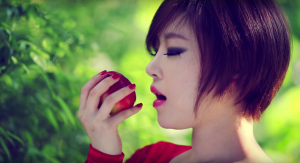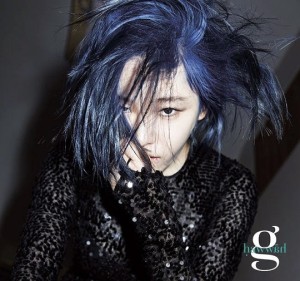 There are few concepts that are as powerful as religion. I may not have any real religious inclinations now, but I spent my formative years attending Episcopal Church services in a rather magnificent cathedral. Those experiences may not have done much for my spiritual beliefs, but they did make a lasting impression on me about power of Christian imagery. While “God” alone has diminished over time into a not-quite-profane exclamation, invocation of further Christian iconography for more sacrilegious purposes still retains a large deal of emotional punch.
There are few concepts that are as powerful as religion. I may not have any real religious inclinations now, but I spent my formative years attending Episcopal Church services in a rather magnificent cathedral. Those experiences may not have done much for my spiritual beliefs, but they did make a lasting impression on me about power of Christian imagery. While “God” alone has diminished over time into a not-quite-profane exclamation, invocation of further Christian iconography for more sacrilegious purposes still retains a large deal of emotional punch.
One of the most popular songs along these lines is Shinee’s “Lucifer”. While it is a song about a manipulative girlfriend, the very title gives the relationship in question more emotional weight. Let’s be honest: when you start comparing your significant other to the devil, it’s a sign that things are little rocky.
If you really loved me, don’t do this to me
Her whisper is the Lucifer, the Lucifer
It can’t grow anymore
Freely empty yourself and look at me
I’ll fill you only
I’ll completely fill you only
Of course, one of the most interesting characteristics is the schism present. The girl is not presented as Satan, merely her words and whispers. This serves to divorce her from her more malignant actions. Indeed, the lyrics pertaining to her have elements of worshipful devoutness, with SHINee pledging themselves to her and her only, and begging for scraps of attention.
This theme was something revisited by Jonghyun later, on his mini-album Base with “Hallelujah”. Typically used as an exuberant cry of jubilation, Jonghyun retains the ecstasy but utilizes a more sensual meaning.
I thank God, I see an angel, tears well up, hallelujah
I see an angel, tears well up, I’m overwhelmed with feeling, hallelujah
You give me greater feelings than awe (feel so good)
You make me sing as if I’m praying
Singing hallelujah,
you got me singing hallelujah
Here, the object of his adoration becomes more than human. She is a divine being unto herself, and Jonghyun positions himself as a faithful parishioner. He refers to her as “a wall than cannot be climbed” and “a holy perfection.” She is untouchable, beyond anything he can comprehend, yet is presented as a benevolent figure, one Jonghyun adores so much that he cannot do anything but literally sing her praises.
 One of the best explorations, and therefore uses, of Christian iconography in K-pop is Ga-in’s mini-album Hawwah. The six-track EP explores Christian morality and how it intersects with modern sexual mores. The most obvious example is “Apple” featuring Jay Park. “Apple” is a retelling of the Garden of Eden, with Ga-in and Jay as Eve and Adam. Here, the Fruit of the Tree of Knowledge is directly equated with sex, as Ga-in attempts to– then successfully– seduce Jay into her bed.
One of the best explorations, and therefore uses, of Christian iconography in K-pop is Ga-in’s mini-album Hawwah. The six-track EP explores Christian morality and how it intersects with modern sexual mores. The most obvious example is “Apple” featuring Jay Park. “Apple” is a retelling of the Garden of Eden, with Ga-in and Jay as Eve and Adam. Here, the Fruit of the Tree of Knowledge is directly equated with sex, as Ga-in attempts to– then successfully– seduce Jay into her bed.
When you say stop it, I wanna do it more, yummy
When you say I can’t have it, I want it more
Hol’ up mommy u needa relax
Go slow girl u movin’ too fast
We can’t do this right here
What if we get in trouble?
We might get punished if we’re not careful
Take a bite or not? Let’s try to wait
It’s a back and forth, with Jay’s arguments becoming weaker and longer as he tries and fails to talk himself out of sex. Ultimately, though, “Apple” is an indictment of religious mores, as it lays bare that, stripped of otherworldly majesty, “we can’t do X because an undefined force said not to” doesn’t really hold up to scrutiny.
On the other side, though, is “Guilty” from the same release. While “Apple” threw Christian values under the bus, “Guilty” shows someone struggling with sexuality, drawing parallels between the power of God and the power of really good sex.
 Ga-in specifically refers to an unwanted sexual attraction as a “bad religion”; something that demands her time and devotion, but apparently does not provide her with much in return. She also uses several word or phrases that have strong ties to Christianity and Christian values: she goes on her knees before him, he touches her, she seeks punishment and is afraid of being ruined. However, these can also be interpreted simultaneously as having a more carnal meaning, with the two halves tied together by the theme of guilt.
Ga-in specifically refers to an unwanted sexual attraction as a “bad religion”; something that demands her time and devotion, but apparently does not provide her with much in return. She also uses several word or phrases that have strong ties to Christianity and Christian values: she goes on her knees before him, he touches her, she seeks punishment and is afraid of being ruined. However, these can also be interpreted simultaneously as having a more carnal meaning, with the two halves tied together by the theme of guilt.
Whether a serious look at the world inwards, or a potent metaphor for a relationship, Christian iconography has provided a wealth of imagery for musicians and artists to draw from. Are there any song that you feel pull heavily from religion? Leave them in the comments.
(Images via: SM Entertainment, APOP Entertainment.)


